自考《英语二》2012版-课程代码00015-课文英汉对照
- 格式:docx
- 大小:192.89 KB
- 文档页数:60
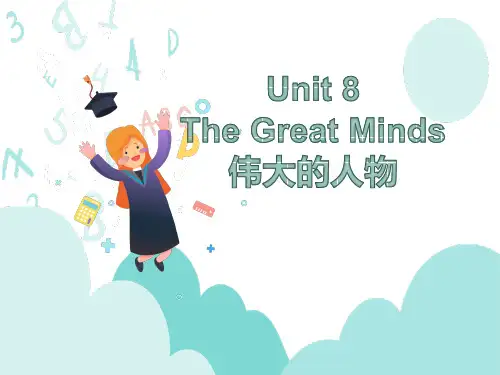
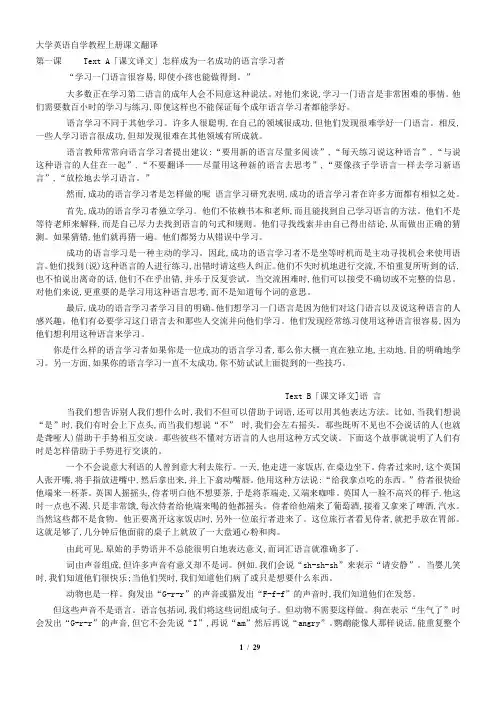
大学英语自学教程上册课文翻译第一课 Text A「课文译文」怎样成为一名成功的语言学习者“学习一门语言很容易,即使小孩也能做得到。
”大多数正在学习第二语言的成年人会不同意这种说法。
对他们来说,学习一门语言是非常困难的事情。
他们需要数百小时的学习与练习,即使这样也不能保证每个成年语言学习者都能学好。
语言学习不同于其他学习。
许多人很聪明,在自己的领域很成功,但他们发现很难学好一门语言。
相反,一些人学习语言很成功,但却发现很难在其他领域有所成就。
语言教师常常向语言学习者提出建议:“要用新的语言尽量多阅读”,“每天练习说这种语言”,“与说这种语言的人住在一起”,“不要翻译——尽量用这种新的语言去思考”,“要像孩子学语言一样去学习新语言”,“放松地去学习语言。
”然而,成功的语言学习者是怎样做的呢语言学习研究表明,成功的语言学习者在许多方面都有相似之处。
首先,成功的语言学习者独立学习。
他们不依赖书本和老师,而且能找到自己学习语言的方法。
他们不是等待老师来解释,而是自己尽力去找到语言的句式和规则。
他们寻找线索并由自己得出结论,从而做出正确的猜测。
如果猜错,他们就再猜一遍。
他们都努力从错误中学习。
成功的语言学习是一种主动的学习。
因此,成功的语言学习者不是坐等时机而是主动寻找机会来使用语言。
他们找到(说)这种语言的人进行练习,出错时请这些人纠正。
他们不失时机地进行交流,不怕重复所听到的话,也不怕说出离奇的话,他们不在乎出错,并乐于反复尝试。
当交流困难时,他们可以接受不确切或不完整的信息。
对他们来说,更重要的是学习用这种语言思考,而不是知道每个词的意思。
最后,成功的语言学习者学习目的明确。
他们想学习一门语言是因为他们对这门语言以及说这种语言的人感兴趣。
他们有必要学习这门语言去和那些人交流并向他们学习。
他们发现经常练习使用这种语言很容易,因为他们想利用这种语言来学习。
你是什么样的语言学习者如果你是一位成功的语言学习者,那么你大概一直在独立地,主动地,目的明确地学习。
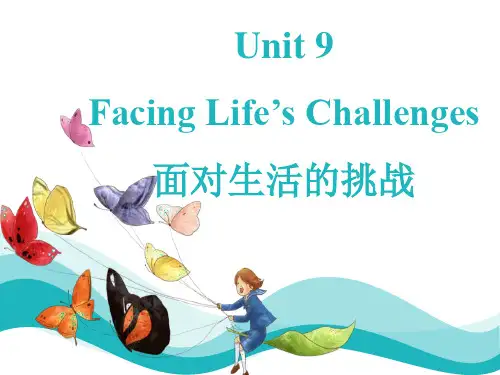
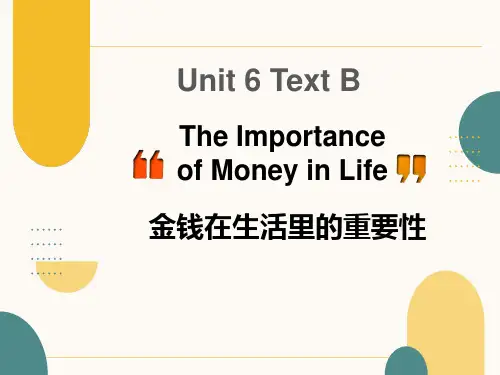
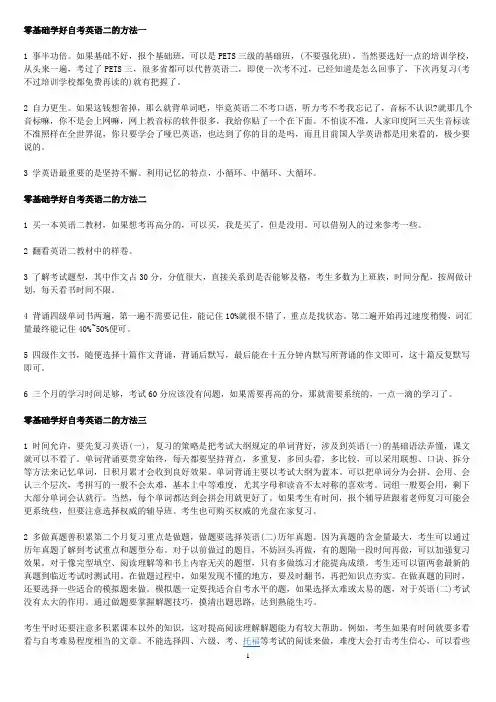
零基础学好自考英语二的方法一1 事半功倍。
如果基础不好,报个基础班,可以是PETS三级的基础班,(不要强化班)。
当然要选好一点的培训学校,从头来一遍,考过了PETS三,很多省都可以代替英语二,即使一次考不过,已经知道是怎么回事了,下次再复习(考不过培训学校都免费再读的)就有把握了。
2 自力更生。
如果这钱想省掉,那么就背单词吧,毕竟英语二不考口语,听力考不考我忘记了,音标不认识?就那几个音标嘛,你不是会上网嘛,网上教音标的软件很多,我给你贴了一个在下面。
不怕读不准,人家印度阿三天生音标读不准照样在全世界混,你只要学会了哑巴英语,也达到了你的目的是吗,而且目前国人学英语都是用来看的,极少要说的。
3 学英语最重要的是坚持不懈。
利用记忆的特点,小循环、中循环、大循环。
零基础学好自考英语二的方法二1 买一本英语二教材,如果想考再高分的,可以买,我是买了,但是没用。
可以借别人的过来参考一些。
2 翻看英语二教材中的样卷。
3 了解考试题型,其中作文占30分,分值很大,直接关系到是否能够及格,考生多数为上班族,时间分配,按周做计划,每天看书时间不限。
4 背诵四级单词书两遍,第一遍不需要记住,能记住10%就很不错了,重点是找状态。
第二遍开始再过速度稍慢,词汇量最终能记住40%~50%便可。
5 四级作文书,随便选择十篇作文背诵,背诵后默写,最后能在十五分钟内默写所背诵的作文即可,这十篇反复默写即可。
6 三个月的学习时间足够,考试60分应该没有问题,如果需要再高的分,那就需要系统的,一点一滴的学习了。
零基础学好自考英语二的方法三1 时间允许,要先复习英语(一),复习的策略是把考试大纲规定的单词背好,涉及到英语(一)的基础语法弄懂,课文就可以不看了。
单词背诵要贯穿始终,每天都要坚持背点,多重复,多回头看,多比较,可以采用联想、口诀、拆分等方法来记忆单词,日积月累才会收到良好效果。
单词背诵主要以考试大纲为蓝本。
可以把单词分为会拼、会用、会认三个层次,考拼写的一般不会太难,基本上中等难度,尤其字母和读音不太对称的喜欢考。
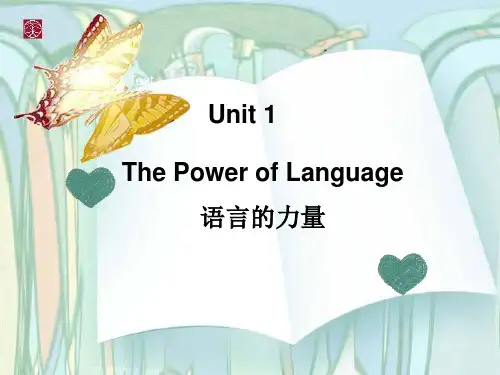
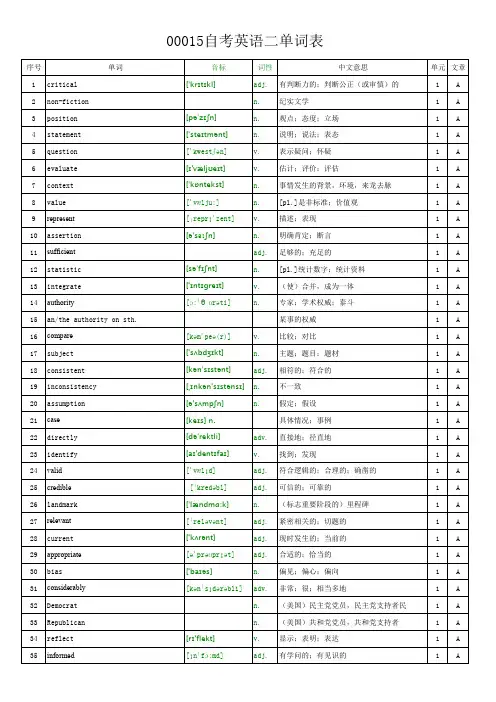
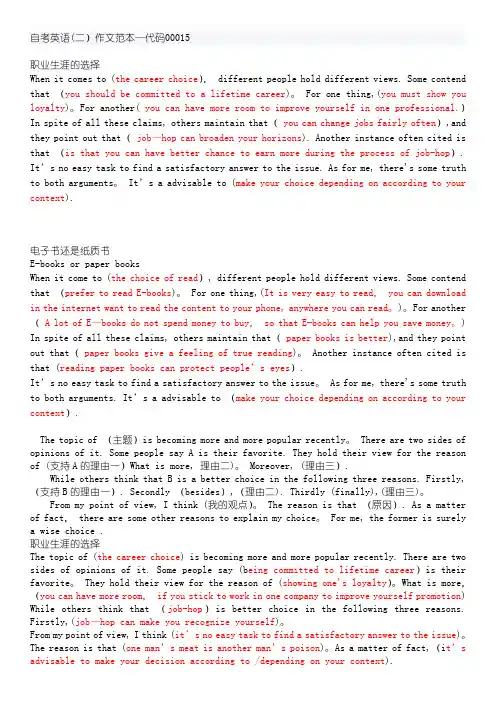
自考英语(二)作文范本—代码00015职业生涯的选择When it comes to (the career choice), different people hold different views. Some contend that (you should be committed to a lifetime career)。
For one thing,(you must show you loyalty)。
For another( you can have more room to improve yourself in one professional.)In spite of all these claims, others maintain that(you can change jobs fairly often),and they point out that(job—hop can broaden your horizons). Another instance often cited is that (is that you can have better chance to earn more during the process of job-hop). It’s no easy task to find a satisfactory answer to the issue. As for me, there's some truth to both arguments。
It’s a advisable to (make your choice depending on according to your context).电子书还是纸质书E-books or paper booksWhen it come to (the choice of read), different people hold different views. Some contend that (prefer to read E-books)。
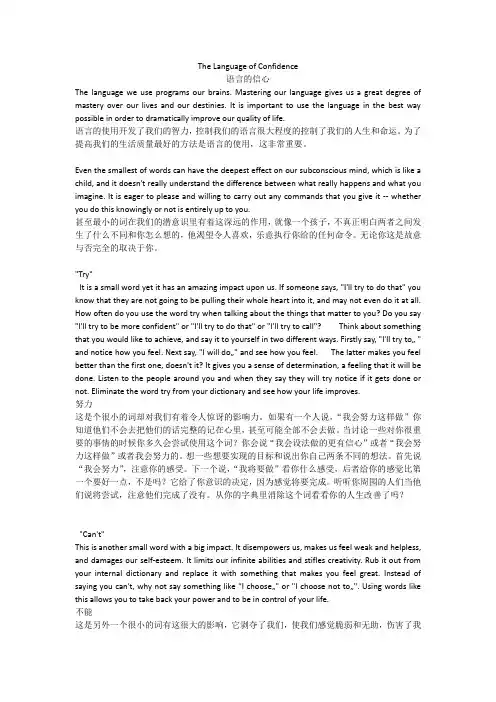
The Language of Confidence语言的信心The language we use programs our brains. Mastering our language gives us a great degree of mastery over our lives and our destinies. It is important to use the language in the best way possible in order to dramatically improve our quality of life.语言的使用开发了我们的智力,控制我们的语言很大程度的控制了我们的人生和命运。
为了提高我们的生活质量最好的方法是语言的使用,这非常重要。
Even the smallest of words can have the deepest effect on our subconscious mind, which is like a child, and it doesn't really understand the difference between what really happens and what you imagine. It is eager to please and willing to carry out any commands that you give it -- whether you do this knowingly or not is entirely up to you.甚至最小的词在我们的潜意识里有着这深远的作用,就像一个孩子,不真正明白两者之间发生了什么不同和你怎么想的,他渴望令人喜欢,乐意执行你给的任何命令。
无论你这是故意与否完全的取决于你。
"Try"It is a small word yet it has an amazing impact upon us. If someone says, "I'll try to do that" you know that they are not going to be pulling their whole heart into it, and may not even do it at all. How often do you use the word try when talking about the things that matter to you? Do you say "I'll try to be more confident" or "I'll try to do that" or "I'll try to call"? Think about something that you would like to achieve, and say it to yourself in two different ways. Firstly say, "I'll try to… " and notice how you feel. Next say, "I will do…" and see how you feel. The latter makes you feel better than the first one, doesn't it? It gives you a sense of determination, a feeling that it will be done. Listen to the people around you and when they say they will try notice if it gets done or not. Eliminate the word try from your dictionary and see how your life improves.努力这是个很小的词却对我们有着令人惊讶的影响力。

⾃考英语⼆(课程代码:00015)单词4500个(含⾳标)a/an ⼀(个);任何⼀(个);每⼀(个)abandon[??b?nd?n]vt. 抛弃,放弃ability[??b?l?ti]n. 能⼒,能够able[e?bl]有能⼒的,能⼲的abnormal[?b'n?:m?l] a.不正常的;变态的aboard[??b?:d]prep.上(船、飞机、车)abolish[?'b?li?]vt.废除(法律等)about[??ba?t]关于above[?'b?v]在..之上abroad[?'br??d]到国外;在国外abrupt[??br?pt]突然的,意外的,粗鲁absence[??bs?ns]不在,缺席absent['?bs?nt] a.不在意的absolute[??bs?lu:t]〈形〉绝对的〈名〉绝对事物absorb[?b?s?:b]vt.吸收abstract['?bstr?kt] a.理论上的 n.抽象abundant[??b?nd?nt]adj. 充裕的,丰富的abuse[??bju:s]〈动〉虐待、滥⽤academic[??k?'demik] a.学院的;学术的academy[?'k?d?mi]n.私⽴中学;专科院校accelerate[?k?sel?re?t]v. 加速,增速,进⾏,迫使accent[??ks?nt]⼝⾳,⾳调accept[?k?sept]vt.接受acceptable[?k?sept?bl] a.可接受的access['?kses]n.接近;通道,⼊⼝accessible[?k?ses?b(?)l]可到达的,可接受的,易相处的)accident[?ks?d?nt]事故,灾难accidental[??ksi'dentl] a.偶然的;⾮本质的accommodation[?;k?m?'dei??n]n.招待设备;预定铺位accompany[??k?mp?ni]〈动〉伴随、伴奏accomplish[??k?mpl??]〈动〉完成、实现accordance[?'k?:d?ns]n.⼀致;和谐;授予account[??ka?nt]〈名〉账户、账单〈动〉把……视为、报账accountant[??ka?nt(?)nt]会计,会计师accumulate[?'kju:mjuleit]vt.积累 vi.堆积accuracy['?kjur?si]n.准确(性);准确度accurate['?kjur?t] a.准确的,正确⽆误的accuse[?'kju:z]vt.指责;归咎于精品⽂档accustomed[?'k?st?md] a.惯常的;习惯的ache[e?k]痛,疼痛achieve[?'t?i:v]vt.完成,实现;达到achievement[?'t?i:vm?nt]n.完成;成就,成绩acid['?sid]n.酸;酸的,酸性的acknowledge[?k'n?lid?]vt.承认;致谢,鸣谢acquaint[?'kweint]vt.使认识,使了解acquaintance[?'kweint?ns]n.认识;了解;熟⼈acquire[?'kwai?]vt.取得;获得;学到acquisition[?kw??z??(?)n]获得,得到acre[?e?k?]英亩across[?'kr??s]穿过,横过act[?kt]表演,扮演(⾓⾊),演出(戏);⾏动,做事action['?k??n]n.作⽤;情节active[??kt?v]adj. 活动的,活跃的activity[?k't?v?ti]活动actor[??kt?(r)]〈名〉男演员actress[??ktr?s]n.⼥演员actual[??kt?u?l]adj. 实际的,现⾏的acute[?'kju:t] a.尖的,锐的;敏锐的AD[?d]⼴告adapt[?'d?pt]vt.使适应;改编add[?d]添加,增加addition[?'di??n]n.加,加法;附加物additional[?'di??n?l] a.附加的,追加的address[??dres]地址adequate[??d?kw?t]adj. ⾜够的,充分的adjust[??d??st]〈动〉调整、调节administration[?d;minis'trei??n]n.管理;管理部门admire[?d?ma??(r)]v. 钦佩,赞美,夸奖admission[?d'mi??n]n.允许进⼊;承认admit[?d?m?t]〈动〉承认、容许adopt[?'d?pt]vt.收养;采⽤;采取adult[??d?lt]adj.成熟的;(智⼒、思想、⾏为)成熟的;成年⼈的;成年的advance[?d?vɑ:ns]〈名〉发展、前进〈动〉促进、提升的〈形〉事先的advanced[?d?vɑ:nst]⾼级的,先进的advantage[?d?vɑ:nt?d?]〈名〉优势、有利条件精品⽂档adventure[?d?vent??(r)]〈名〉冒险〈动〉冒险advertise['?dv?taiz]vt.通知 vi.登⼴告advertisement〈名〉⼴告、宣传advice[? d'vais]n.劝告;忠告;意见advisable[?d'vaiz?bl]n.明智的;可取的advise[?d'vaiz]vt.劝告;建议;通知advocate['?dv?kit]n.辩护者 vt.拥护affair[?'fe?]n.事情,事件;事务affect[?'fekt]vt.影响;感动affection[?'fek??n]n.慈爱,爱;爱慕afford[?'f?:d]vt.担负得起…;提供afraid[?'fre?d]害怕的Africa[??frik?]n.⾮洲African[??fr?k?n] a.⾮洲(⼈)的 n.⾮洲⼈after[?ɑ:ft?(r)]后来,在……之后afternoon[?ɑ:ft??nu:n]下午afterward(s)['ɑ:ft?w?d]ad.后来,以后again[?'gen]⼜,再against[?'genst]与…对抗,对着age[e?d?]vt.变⽼agency[?e?d??nsi]代理机构agenda[??d?end?]n.议程agent[?e?d??nt]代理⼈,经济⼈aggressive[?'gresiv] a.侵略的;好⽃的ago[?'g??]以前agree[?'gri?]同意,赞成agreement[??gri:m?nt]〈名〉协定、同意agriculture[??ɡr?k?lt??]农业,农学ahead[??hed]adv.在前⾯aid[eid]n.帮助,救护;助⼿AIDS[e?dz]艾滋病aim[eim]vi.瞄准,针对;致⼒air[e?]天空,空⽓air-conditioning[?e?k?n?dn??]n.空调设备aircraft[krɑ:ft]n.飞机,航空器airline[e?la?n]定期航线airplane/aeroplane['e?r?plein]n.飞机airport[p?:t]n.机场airway[?e??we?]航线;(常复)航空公司alarm[??lɑ:m]〈名〉闹钟、警报器精品⽂档album['?lb?m]n.粘贴簿;相册;⽂选alcohol[??lk?h?l]n.酒精alert[?'l?:t] a.警惕的;活跃的alike[?'laik] a.同样的,相同的alive[?'laiv] a.活着的;活跃的all[?:l]全部地;所有的allergic[??l??d??k]过敏的,厌恶allow[?'la?]允许,准许allowance[?'lau?ns]n津贴,补助费almost[??lm??st]⼏乎,差不多alone[??l?un]adj. 单独的along[??l??]〈副〉沿着、顺着〈介〉沿着……alongside[?l??'said]prep.在…旁边aloud[??la?d]⼤声地alphabet['?lf?bet]n.字母表,字母系统already[??l'redi]已经also[??:ls?u]也alter[??:lt?(r)]〈动〉改变alternative[?:l't?:n?tiv]n.替换物;取舍,抉择although[??l'e??]虽然;尽管altogether[??lt??ɡee?]总共always[??:lwe?z]总是;⼀直;永远am[?m]是a.m./A.M./AM[??nt?me?r?d?em]午前,上午amateur['?m?t?] a.业余的n.业余爱好者amaze[?'meiz]vt.使惊奇,使惊愕amazing[?'me?z??]adj.令⼈惊异的vt.使⼤为吃惊,使惊奇( amaze的现在分词);使惊异:感到⾮常好奇n.吃惊;好奇ambassador[?m'b?s?d?]n.⼤使,使节ambition[?m'bi??n]n.雄⼼,抱负,野⼼ambitious[?m'bi??s] a.有雄⼼的;热望的ambulance[??mbj?l?ns]n.救护车America[??mer?k?]美国American[??mer?k?n]美国的;美国⼈的,美国⼈among(st)prep.在…之中,在...中间amount[??ma?nt]n. 量,总数,数量amuse[?'mju:z]vt.逗…乐;给…娱乐amusement[?'mju:zm?nt]n.娱乐,消遣,乐趣精品⽂档。
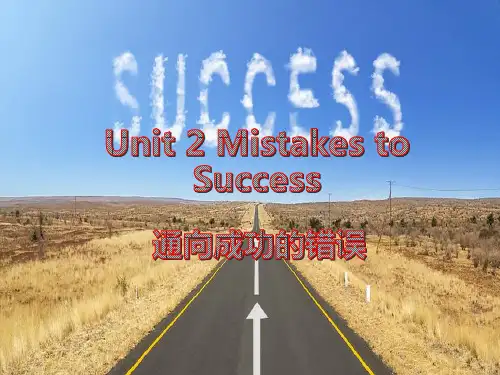
2012年版自考英语二(00015)单词解析完整版I. New words and expressionsNew words1. critical adj. 有判断力的;判断公正(或审慎)的2. non-fiction n. 纪实文学3. position n. 观点;态度;立场4. statement n. 说明;说法;表态5. question v. 表示疑问;怀疑out of question / out of the question6. evaluate v. 估计;评价;评估7. context n. 事情发生的背景,环境,来龙去脉8. value n. values [pl.]是非标准;价值观valuableinvaluable=pricelessvalueless9. represent v. 描述;表现representative adj./n.10. assertion n. 明确肯定;断言11. sufficient adj. 足够的;充足的sufficiencyinsufficient12. statistic n. statistics [pl.]统计数字;统计资料13. integrate v.(使)合并,成为一体14. authority n.专家;学术权威;泰斗26. relevant adj. 紧密相关的;切题的relevancy n. 关联;恰当irrelevant27. current adj. 现时发生的;当前的28. appropriate adj. 合适的;恰当的inappropriateIt's (not) appropriate that ….29. bias n. 偏见;偏心;偏向30. considerably adv. 非常;很;相当多地considerconsideringconsiderableconsiderateconsideration31. Democrat n. (美国)民主党党员,民主党支持者民32. Republican n. (美国)共和党党员,共和党支持者33. reflect v. 显示;表明;表达34. informed adj. 有学问的;有见识的well-informedill-informedPhrases and Expressions1. apply to 使用;应用2. put forth 提出;产生3. take …into account 考虑到;顾及4. accept/take …at face value 相信表面;信以为真5. with a grain of salt 有保留地;持怀疑态度地I. New words and expressionsNew words1. confidence n.自信心;把握相关词:confidentbe confident of sb. / sth.have / lose confidence in sb. / sth.注意比较:confident / confidential2. program v. 训练;培养3. mastery n. 控制;驾驭4. destiny n. 命运;天命;天数5. dramatically adv. 巨大地;惊人地;显著地6. quality n. 质量;品质7. subconscious adj. 下意识的;潛意识的8. please v. 使满意;使愉快9. command n.(给人或动物的)命令10. knowingly adv. 故意地;蓄意地11. impact n. 巨大影响;强大作用12. matter v. 事关紧要;有重大影响13. confident adj. 自信的;有自信心的14. sense n.(对重大事情的)感觉,意识15. eliminate v. 排除;清除;消除eliminate all grammatical mistakesbe eliminated in the first round16. disempower v. 剥夺;使失去权利;剥夺力量注意构词法:dis(表示否定)+em(使,赋予)+poweren- / em-常见的动词前缀,如:enable, enrich, endanger, enlarge 等。
大学英语自学教程上册课文翻译第一课 Text A「课文译文」怎样成为一名成功的语言学习者“学习一门语言很容易,即使小孩也能做得到。
”大多数正在学习第二语言的成年人会不同意这种说法。
对他们来说,学习一门语言是非常困难的事情。
他们需要数百小时的学习与练习,即使这样也不能保证每个成年语言学习者都能学好。
语言学习不同于其他学习。
许多人很聪明,在自己的领域很成功,但他们发现很难学好一门语言。
相反,一些人学习语言很成功,但却发现很难在其他领域有所成就。
语言教师常常向语言学习者提出建议:“要用新的语言尽量多阅读”,“每天练习说这种语言”,“与说这种语言的人住在一起”,“不要翻译——尽量用这种新的语言去思考”,“要像孩子学语言一样去学习新语言”,“放松地去学习语言。
”然而,成功的语言学习者是怎样做的呢语言学习研究表明,成功的语言学习者在许多方面都有相似之处。
首先,成功的语言学习者独立学习。
他们不依赖书本和老师,而且能找到自己学习语言的方法。
他们不是等待老师来解释,而是自己尽力去找到语言的句式和规则。
他们寻找线索并由自己得出结论,从而做出正确的猜测。
如果猜错,他们就再猜一遍。
他们都努力从错误中学习。
成功的语言学习是一种主动的学习。
因此,成功的语言学习者不是坐等时机而是主动寻找机会来使用语言。
他们找到(说)这种语言的人进行练习,出错时请这些人纠正。
他们不失时机地进行交流,不怕重复所听到的话,也不怕说出离奇的话,他们不在乎出错,并乐于反复尝试。
当交流困难时,他们可以接受不确切或不完整的信息。
对他们来说,更重要的是学习用这种语言思考,而不是知道每个词的意思。
最后,成功的语言学习者学习目的明确。
他们想学习一门语言是因为他们对这门语言以及说这种语言的人感兴趣。
他们有必要学习这门语言去和那些人交流并向他们学习。
他们发现经常练习使用这种语言很容易,因为他们想利用这种语言来学习。
你是什么样的语言学习者如果你是一位成功的语言学习者,那么你大概一直在独立地,主动地,目的明确地学习。
a/an 一(个);任何一(个);每一(个)abandon[əˈbændən]vt. 抛弃,放弃ability[əˈbɪləti]n. 能力,能够able[eɪbl]有能力的,能干的abnormal[æb'nɔ:məl] a.不正常的;变态的aboard[əˈbɔ:d]prep.上(船、飞机、车)abolish[ə'bɔliʃ]vt.废除(法律等)about[əˈbaʊt]关于above[ə'bʌv]在..之上abroad[ə'brɔːd]到国外;在国外abrupt[əˈbrʌpt]突然的,意外的,粗鲁absence[ˈæbsəns]不在,缺席absent['æbsənt] a.不在意的absolute[ˈæbsəlu:t]〈形〉绝对的〈名〉绝对事物absorb[əbˈsɔ:b]vt.吸收abstract['æbstrækt] a.理论上的 n.抽象abundant[əˈbʌndənt]adj. 充裕的,丰富的abuse[əˈbju:s]〈动〉虐待、滥用academic[ˌækə'demik] a.学院的;学术的academy[ə'kædəmi]n.私立中学;专科院校accelerate[əkˈseləreɪt]v. 加速,增速,进行,迫使accent[ˈæksənt]口音,音调accept[əkˈsept]vt.接受acceptable[əkˈseptəbl] a.可接受的access['ækses]n.接近;通道,入口accessible[əkˈsesɪb(ə)l]可到达的,可接受的,易相处的)accident[æksɪdənt]事故,灾难accidental[ˌæksi'dentl] a.偶然的;非本质的accommodation[ə;kɔmə'deiʃən]n.招待设备;预定铺位accompany[əˈkʌmpəni]〈动〉伴随、伴奏accomplish[əˈkʌmplɪʃ]〈动〉完成、实现accordance[ə'kɔ:dəns]n.一致;和谐;授予account[əˈkaʊnt]〈名〉账户、账单〈动〉把……视为、报账accountant[əˈkaʊnt(ə)nt]会计,会计师accumulate[ə'kju:mjuleit]vt.积累 vi.堆积accuracy['ækjurəsi]n.准确(性);准确度accurate['ækjurət] a.准确的,正确无误的accuse[ə'kju:z]vt.指责;归咎于精品文档accustomed[ə'kʌstəmd] a.惯常的;习惯的ache[eɪk]痛,疼痛achieve[ə'tʃi:v]vt.完成,实现;达到achievement[ə'tʃi:vmənt]n.完成;成就,成绩acid['æsid]n.酸;酸的,酸性的acknowledge[ək'nɔlidʒ]vt.承认;致谢,鸣谢acquaint[ə'kweint]vt.使认识,使了解acquaintance[ə'kweintəns]n.认识;了解;熟人acquire[ə'kwaiə]vt.取得;获得;学到acquisition[ækwɪˈzɪʃ(ə)n]获得,得到acre[ˈeɪkə]英亩across[ə'krɔːs]穿过,横过act[ækt]表演,扮演(角色),演出(戏);行动,做事action['ækʃən]n.作用;情节active[ˈæktɪv]adj. 活动的,活跃的activity[æk'tɪvɪti]活动actor[ˈæktə(r)]〈名〉男演员actress[ˈæktrəs]n.女演员actual[ˈæktʃuəl]adj. 实际的,现行的acute[ə'kju:t] a.尖的,锐的;敏锐的AD[æd]广告adapt[ə'dæpt]vt.使适应;改编add[æd]添加,增加addition[ə'diʃən]n.加,加法;附加物additional[ə'diʃənəl] a.附加的,追加的address[əˈdres]地址adequate[ˈædɪkwət]adj. 足够的,充分的adjust[əˈdʒʌst]〈动〉调整、调节administration[əd;minis'treiʃən]n.管理;管理部门admire[ədˈmaɪə(r)]v. 钦佩,赞美,夸奖admission[əd'miʃən]n.允许进入;承认admit[ədˈmɪt]〈动〉承认、容许adopt[ə'dɔpt]vt.收养;采用;采取adult[ˈædʌlt]adj.成熟的;(智力、思想、行为)成熟的;成年人的;成年的advance[ədˈvɑ:ns]〈名〉发展、前进〈动〉促进、提升的〈形〉事先的advanced[ədˈvɑ:nst]高级的,先进的advantage[ədˈvɑ:ntɪdʒ]〈名〉优势、有利条件精品文档adventure[ədˈventʃə(r)]〈名〉冒险〈动〉冒险advertise['ædvətaiz]vt.通知 vi.登广告advertisement〈名〉广告、宣传advice[əd'vais]n.劝告;忠告;意见advisable[əd'vaizəbl]n.明智的;可取的advise[əd'vaiz]vt.劝告;建议;通知advocate['ædvəkit]n.辩护者 vt.拥护affair[ə'feə]n.事情,事件;事务affect[ə'fekt]vt.影响;感动affection[ə'fekʃən]n.慈爱,爱;爱慕afford[ə'fɔ:d]vt.担负得起…;提供afraid[ə'freɪd]害怕的Africa[ˈæfrikə]n.非洲African[ˈæfrɪkən] a.非洲(人)的 n.非洲人after[ˈɑ:ftə(r)]后来,在……之后afternoon[ˌɑ:ftəˈnu:n]下午afterward(s)['ɑ:ftəwəd]ad.后来,以后again[ə'gen]又,再against[ə'genst]与…对抗,对着age[eɪdʒ]vt.变老agency[ˈeɪdʒənsi]代理机构agenda[əˈdʒendə]n.议程agent[ˈeɪdʒənt]代理人,经济人aggressive[ə'gresiv] a.侵略的;好斗的ago[ə'gəʊ]以前agree[ə'griː]同意,赞成agreement[əˈgri:mənt]〈名〉协定、同意agriculture[ˈæɡrɪkʌltʃə]农业,农学ahead[əˈhed]adv.在前面aid[eid]n.帮助,救护;助手AIDS[eɪdz]艾滋病aim[eim]vi.瞄准,针对;致力air[eə]天空,空气air-conditioning[ˈeəkənˌdɪʃɵnɪŋ]n.空调设备aircraft[ˈɛəkrɑ:ft]n.飞机,航空器airline[eəlaɪn]定期航线airplane/aeroplane['eərəplein]n.飞机airport[ˈɛəpɔ:t]n.机场airway[ˈeəˌweɪ]航线;(常复)航空公司alarm[əˈlɑ:m]〈名〉闹钟、警报器精品文档album['ælbəm]n.粘贴簿;相册;文选alcohol[ˈælkəhɒl]n.酒精alert[ə'lə:t] a.警惕的;活跃的alike[ə'laik] a.同样的,相同的alive[ə'laiv] a.活着的;活跃的all[ɔ:l]全部地;所有的allergic[əˈlɜːdʒɪk]过敏的,厌恶allow[ə'laʊ]允许,准许allowance[ə'lauəns]n津贴,补助费almost[ɔːlməʊst]几乎,差不多alone[əˈləun]adj. 单独的along[əˈlɔŋ]〈副〉沿着、顺着〈介〉沿着……alongside[əlɔŋ'said]prep.在…旁边aloud[əˈlaʊd]大声地alphabet['ælfəbet]n.字母表,字母系统already[ɔːl'redi]已经also[ˈɔ:lsəu]也alter[ˈɔ:ltə(r)]〈动〉改变alternative[ɔ:l'tə:nətiv]n.替换物;取舍,抉择although[ɔːl'ðəʊ]虽然;尽管altogether[ɔːltəˈɡeðə]总共always[ˈɔ:lweɪz]总是;一直;永远am[æm]是a.m./A.M./AM[ˈæntɪmeˈrɪdɪem]午前,上午amateur['æmətə] a.业余的n.业余爱好者amaze[ə'meiz]vt.使惊奇,使惊愕amazing[ə'meɪzɪŋ]adj.令人惊异的vt.使大为吃惊,使惊奇( amaze的现在分词);使惊异:感到非常好奇n.吃惊;好奇ambassador[æm'bæsədə]n.大使,使节ambition[æm'biʃən]n.雄心,抱负,野心ambitious[æm'biʃəs] a.有雄心的;热望的ambulance[ˈæmbjələns]n.救护车America[əˈmerɪkə]美国American[əˈmerɪkən]美国的;美国人的,美国人among(st)prep.在…之中,在...中间amount[əˈmaʊnt]n. 量,总数,数量amuse[ə'mju:z]vt.逗…乐;给…娱乐amusement[ə'mju:zmənt]n.娱乐,消遣,乐趣精品文档analysis[ə'næləsis]n.分析,分解,解析analyze/analyse['ænəlaiz]vt.分析,分解,解析ancestor['ænsəstə]n.祖宗,祖先ancient[ˈeɪnʃənt]〈形〉古老的〈名〉老人、古代人and[ənd]和anger[ˈæŋɡə]怒,愤怒angle[ˈæŋgl]n.角度,角angry[ˈæŋgri]生气的,愤怒的animal[ˈænɪml]动物ankle['æŋkəl]n.踝,踝节部anniversary[ˌæni'və:səri]n.周年纪念日announce[ə'nauns]vt.报告…的来到announcement[əˈnaʊnsmənt]通告,通知annoy[əˈnɔɪ]v. 使恼怒,打扰another[əˈnʌðə(r)]另一个answer['ɑ:nsə]vi.符合,适合ant[ænt]蚂蚁antarctic[æn'tɑ:ktik] a.南极的 n.南极区Antarctica[æntˈɑ:ktɪkə,]南极洲anticipate[æn'tisipeit]vt.预料,预期,期望antique[æn'ti:k] a.古代的 n.古物anxiety[æŋ'zaiəti]n.焦虑,忧虑;渴望anxious[ˈæŋkʃəs]adj. 渴望的any[eni](用于否定句,疑问句等)什么,任何anybody['eni;bɔdi]n.重要人物anyhow[ˈenɪhaʊ]不管怎样anyone[enɪwʌn]任何人anything[ˈeniθɪŋ]任何东西anyway[ˈeniweɪ]adv.不论以何种方式anywhere[enɪhweə]任何地方apart[əˈpɑːt]相隔,相距,除外apartment n.[英]房间,套间;[美]公寓apologize/apologise vi.道歉,谢罪,认错apology[əˈpɒlədʒi]道歉;歉意apparent[ə'pærənt] a.显然的appeal[ə'pi:l]vi.&n.呼吁;申述appealing[əˈpi:lɪŋ]adj.吸引人的appear[əˈpiə]vt. 出现,似乎精品文档appearance[əˈpɪərəns]出现,露面;容貌appetite[ˈæpɪtaɪt]食欲,胃口applaud[ə'plɔ:d]vt.喝彩;欢呼 vi.欢呼applause[ə'plɔ:z]n.喝彩;夸奖,称赞apple[ˈæpl]苹果application[ˌæpli'keiʃən]n.请求,申请;施用apply[ə'plai]vt.应用,实施,使用appoint[ə'pɔint]vt.任命,委任;约定appointment[ə'pɔintmənt]n.任命;约定,约会appreciate[ə'pri:ʃieit]vt.欣赏;领会;感谢appreciation[ə;pri:ʃi'eiʃən]n.欣赏;鉴别;感激approach[ə'prəutʃ]vt.向…靠近 n.靠近appropriate[ə'prəuprieit] a.适当的,恰当的approximately[ə'prɔksimətli]ad.近似地,大约april['eiprəl]n.四月arab[ˈærəb]阿拉伯的阿拉伯人arabic[ˈærəbɪk]阿拉伯语的阿拉伯语arbitrary['ɑ:bitrəri] a.随心所欲的;专断的architect['ɑ:kitekt]n.建筑师;创造者architecture['ɑ:kitektʃə]n.建筑学;建筑式样arctic['ɑ:ktik] a.北极的 n.北极area[ˈɛəriə]n.面积;地区,地域;领域,范围argue[ˈɑ:gju:]vi.争论,争辩,辩论argument[ˈɑ:gjumənt]n.争论(吵),辩论;理由;论证arise[ə'raiz]vi.出现;由…引起arithmetic[əˈrɪθmətɪk]n. 算术arm[ɑ:m]n.手臂,扶手,臂状物 v.武装;配备 n.武器army[ˈɑ:mi]n.军队,陆军,军;大群,大批around[əˈraʊnd]ad.在...周围,到处 prep.在..四周(或附近)arouse[ə'rauz]vt.引起,唤起;唤醒arrange[əˈreɪndʒ]v. 排列arrangement[əˈreɪndʒmənt]安排,布置arrest[əˈrest]n.逮捕,扣留 vt.逮捕,扣留;阻止;吸引arrival[əˈraɪvl]n.到达,到来;到达者,到达物精品文档arrive[əˈraɪv]vi.到达;(时间、事件)到来,发生;达到arrow[ˈærəu]n.箭,矢,箭状物;箭头符号art[ɑ:t]n.艺术,美术;技术,技艺;文科,人文科学article[ˈɑ:tɪkl]n. 论文,物品artificial[ˌɑ:tɪˈfɪʃl] a.人工的,人造的,人为的;虚伪的,做作的artist[ˈɑ:tɪst]n.艺术家,美术家;(某方面的)能手artwork[ˈɑ:twə:k]n.艺术品;插图as[əz]ad.同样地 conj.由于;像...一样 prep.作为ash[æʃ]n.灰,灰末;(pl.)骨灰;(pl.)废墟ashamed[əˈʃeɪmd] a.惭愧的,羞耻的,害臊的asia[ˈeɪʃə]n.亚洲asian[ˈeɪʃn] a.亚洲(人)的 n.亚洲人aside[əˈsaɪd]ad.在旁边,到一边 n.旁白;离题的话ask[ɑ:sk]vt.问,询问;请求,要求;邀请,约请asleep[əˈsli:p]〈形〉睡着的〈副〉睡着aspect[ˈæspekt]n. 方面,样子,外表aspiration[ˌæspəˈreɪʃn]n. 热望,渴望assemble[əˈsembl]vt. 聚集assembly[əˈsembli]n. 集会assert[ə'sə:t]vt.断言,宣称;维护assess[ə'ses]vt.对(财产等)估价asset[ˈæset]n. 财产,财富assignment[ə'sainmənt]n.任务,指定的作业assist[ə'sist]vt.援助,帮助;搀扶assistance[əˈsɪstəns]n.协作; 援助; 帮助assistant[ə'sistənt]n.助手,助理;助教associate[ə'səuʃieit]vi.交往 n.伙伴,同事association[ə;səusi'eiʃən]n.协会,团体;联合assume[ə'sju:m]vt.假定;承担;呈现assumption[ə'sʌmpʃən]n.采取;假定;傲慢assure[ə'ʃuə]vt.使确信;向…保证astonish[əˈstɒnɪʃ]vt. 使惊讶astronomer[əˈstrɒnəmə]天文学家精品文档at prep.[表示价格、速度等]以,达;在..方面athlete['æθlit, 'æθli:t]n.运动员;田径运动员atlantic[ætˈlæntɪk] a.大西洋的 n.[theAtlantic]大西洋atmosphere[ˈætməsfɪə(r)]n. 气氛,大气层atom['ætəm]n.微粒;微量atomic[əˈtɔmik]adj.原子的;原子能的attach[ə'tætʃ]vt.缚,系,贴;附加attack[ə'tæk]vt.&vi.&n.攻击,进攻attain[ə'tein]vt.达到,获得,完成attempt[ə'tempt]vt.尝试,试图 n.企图attend[əˈtend]vt. 参加attendance[ə'tendəns]n.到场;出席人数attention[əˈtenʃn]n.注意,注意力;立正;特别照顾;照料attentively[ə'tentɪvli]注意地attitude[ˈætitju:d]n.态度,看法(to, toward,about);姿势attract[əˈtrækt]vt.引起的注意(或兴趣等),吸引;引起;激起attraction[əˈtrækʃ(ə)n]吸引,爱慕attractive[əˈtræktɪv] a.吸引人的,引人注意的;漂亮的,迷人的attribute[ə'tribju:t]vt.把…归因于 n.属性audience['ɔ:diəns]n.正式会见;拜会audio[ˈɔːdiəʊ]n./a.音频(响)(的);声音(的),听觉(的)august[ˈɔ:gəst]n.8月aunt[ɑ:nt]n.姨母,姑母,伯母,婶母,舅母,阿姨australia[ɔ'streiliə]n.澳大利亚australian[ɔ'streiliən] a.澳大利亚的authentic[ɔ:ˈθentɪk]adj. 可靠,又根据,真实的author['ɔ:θə]n.创造者,创始人authority[ɔ:'θɔriti]n.当局,官方;权力auto[ˈɔːtəʊ]n.(automobile)(口语)汽车automate[ˈɔ:təmeɪt]vt.&vi.(使)自动化automatic[ˌɔ:tə'mætik] a.自动的;机械的automobile['ɔ:təməbi:l]n.汽车,机动车autumn[ˈɔ:təm]n.秋,秋季;成熟期,渐衰期精品文档available[ə'veiləbəl] a.可利用的;通用的avenue[ˈævənju:]n.林荫路,大街;(比喻)途径,渠道,方法average[ˈævərɪdʒ]adj. 一般的,平均的avoid[əˈvɔɪd]vt. 避免。
大学英语自学教程(下)01-A. What Is a Decision?A decision is a choice made from among alternative courses of action that are available. The purpose of making a decision is to establish and achieve organizational goals and objectives. The reason for making a decision is that a problem exists, goals or objectives are wrong, or something is standing in the way of accomplishing them.Thus the decision-making process is fundamental to management. Almost everything a manager does involves decisions, indeed, some suggest that the management process is decision making. Although managers cannot predict the future, many of their decisions require that they consider possible future events. Often managers must make a best guess at what the future will be and try to leave as little as possible to chance, hut since uncertainty is always there, risk accompanies decisions. Sometimes the consequences of a poor decision are slight; at other times they are serious.Choice is the opportunity to select among alternatives. If there is no choice, there is no decision to be made. Decision making is the process of choosing, and many decisions have a broad range of choice. For example, a student may be able to choose among a number of different courses in order to implement the decision to obtain a college degree. For managers, every decision has constraints based on policies, procedures, laws, precedents, and the like. These constraints exist at all levels of the organization.Alternatives are the possible courses of action from which choices can be made. If there are no alternatives, there is no choice and, therefore, no decision. If no alternatives are seen, often it means that a thorough job of examining the problems has not been done. For example, managers sometimes treat problems in an either/or fashion; this is their way of simplifying complex problems. But the tendency to simplify blinds them to other alternatives.At the managerial level, decision making includes limiting alternatives as well as identifying them, and the range is from highly limited to practically unlimited.Decision makers must have some way of determining which of several alternatives is best -- that is, which contributes the most to the achievement of organizational goals. An organizational goal is an end or a state of affairs the organization seeks to reach. Because individuals (and organizations) frequently have different ideas about how to attain the goals, the best choice may depend on who makes the decision. Frequently, departments or units within an organization make decisions that are good for them individually but that are less than optimal for the larger organization. Called suboptimization, this is a trade-off that increases the advantages to one unit or function but decreases the advantages to another unit or function. For example, the marketing manager may argue effectively for an increased advertising budget. In the larger scheme of things, however, increased funding for research to improve the products might be more beneficial to the organization.These trade-offs occur because there are many objectives that organizations wish to attainsimultaneously. Some of these objectives are more important than others, but the order and degree of importance often vary from person to person and from department to department. Different managers define the same problem in different terms. When presented with a common case, sales managers tend to see sales problems, production managers see production problems, and so on.The ordering and importance of multiple objectives is also based, in part, on the values of the decision maker. Such values are personal; they are hard to understand, even by the individual, because they are so dynamic and complex. In many business situations different people's values about acceptable degrees of risk and profitability cause disagreement about the correctness of decisions.People often assume that a decision is an isolated phenomenon. But from a systems point of view, problems have multiple causes, and decisions have intended and unintended consequences. An organization is an ongoing entity, and a decision made today may have consequences far into the future. Thus the skilled manager looks toward the future consequences of current decisions. 01-B. Secrets of Success at an InterviewThe subject of today's talk is interviews.The key words here are preparation and confidence, which will carry you far.Do your homework first.Find out all you can about the job you are applying for and the organization you hope to work for.Many of the employers I interviewed made the same criticism of candidates. "They have no idea what the day to day work of the job brings about. They have vague notions of "furthering the company's prospects’ or of 'serving the community', but have never taken the trouble to find out the actual tasks they will be required to do.”Do not let this be said of you. It shows an unattractive indifference to your employer and to your job.Take the time to put yourself into the interviewer's place. He wants somebody who is hard-working with a pleasant personality and a real interest in the job.Anything that you find out about the prospective employer can be used to your advantage during the interview to show that you have bothered to master some facts about the people who you hope to work for.Write down (and remember) the questions you want to ask the interviewer(s) so that you are not speechless when they invite your questions. Make sure that holidays and pay are not the first things you ask about. If all your questions have been answered during the interview, reply: "In fact, I did have several questions, but you have already answered them all.”Do not be afraid to ask for clarification of something that has been said during the interview if you want to be sure what was implied, but do be polite.Just before you go to the interview, look again at the original advertisement that you answered,any correspondence from your prospective employer, photocopies of your letter of application or application form and your resume.Then you will remember what you said and what they want. This is very important if you have applied for many jobs in a short time as it is easy to become confused and give an impression of inefficiency.Make sure you know where and when you have to report for the interview. Go to the building (but not inside the office) a day or two before, if necessary, to find out how long the journey takes and where exactly the place is.Aim to arrive five or ten minutes early for the actual interview, then you will have a little time in hand and you will not panic if you are delayed. You start at a disadvantage if you arrive worried and ten minutes late.Dress in clean, neat, conservative clothes. Now is NOT the time to experiment with the punk look or (girls) to wear low-cut dresses with miniskirts. Make sure that your shoes, hands and hair (and teeth) are clean and neat.Have the letter inviting you for an interview ready to show in case there is any difficulty in communication.You may find yourself facing one interviewer or a panel. The latter is far more intimidating, but do not let it worry you too much. The interviewer will probably have a table in front of him/her. Do not put your things or arms on it.If you have a bag or a case, put it on the floor beside your chair. Do not clutch it nervously or, worse still, drop it, spilling everything.Shake hands if the interviewer offers his hand first. There is little likelihood that a panel of five wants to go though the process of all shaking hands with you in turn. So you do not be upset if no one offers.Shake hands firmly -- a weak hand suggests a weak personality, and a crushing grip is obviously painful. Do not drop the hand as soon as yours has touched it as this will seem to show you do not like the other person.Speak politely and naturally even if you are feeling shy. Think before you answer any questions. If you cannot understand, ask: "Would you mind rephrasing the question, please?" The question will then be repeated in different words.If you are not definitely accepted or turned down on the spot, ask: "When may I expect to hear the results of this interview?"If you do receive a letter offering you the job, you must reply by letter (keep a photocopy) as soon as possible.Good luck!02-A. Black HolesWhat is a black hole? Well, it's difficult to answer this question, since the terms we would normally use to describe a scientific phenomenon are inadequate here. Astronomers andscientists think that a black hole is a region of space (not a thing ) into which matter has fallen and from which nothing can escape ?not even light. So we can't see a black hole. A black hole exerts a strong gravitational pull and yet it has no matter. It is only space -- or so we think. How can this happen?The theory is that some stars explode when their density increases to a particular point; they collapse and sometimes a supernova occurs. From earth, a supernova looks like a very bright light in the sky which shines even in the daytime. Supernovae were reported by astronomers in the seventeenth and eighteenth centuries. Some people think that the Star of Bethlehem could have been a supernova. The collapse of a star may produce a White Dwarf or a neutron star -- a star, whose matter is so dense that it continually shrinks by the force of its own gravity. But if the star is very large (much bigger than our sun) this process of shrinking may be so intense that a black hole results. Imagine the earth reduced to the size of a marble, but still having the same mass and a stronger gravitational pull, and you have some idea of the force of a black hole. Any matter near the black hole is sucked in. It is impossible to say what happens inside a black hole. Scientists have called the boundary area around the hole the "event horizon." We know nothing about events which happen once objects pass this boundary. But in theory, matter must behave very differently inside the hole.For example, if a man fell into a black hole, he would think that he reached the center of it very quickly. However an observer at the event horizon would think that the man never reached the center at all. Our space and time laws don't seem to apply to objects in the area of a black hole. Einstein's relativity theory is the only one which can explain such phenomena. Einstein claimed that matter and energy are interchangeable, so that there is no "absolute" time and space. There are no constants at all, and measurements of time and space depend on the position of the observer. They are relative. We do not yet fully understand the implications of the relativity theory; but it is interesting that Einstein's theory provided a basis for the idea of black holes before astronomers started to find some evidence for their existence. It is only recently that astronomers have begun specific research into black holes. In August 1977, a satellite was launched to gather data about the 10 million black holes which are thought to be in the Milky Way. And astronomers are planning a new observatory to study the individual exploding stars believed to be black holes,The most convincing evidence of black holes comes frown research into binary star systems. Binary stars, as their name suggests, are twin stars whose position in space affects each other. In some binary systems, astronomers have shown that there is an invisible companion star, a "partner" to the one which we can see in the sky. Matter from the one which we can see is being pulled towards the companion star. Could this invisible star, which exerts such a great force, be a black hole? Astronomers have evidence of a few other stars too, which might have black holes as companions.The story of black holes is just beginning. Speculations about them. are endless. There might bea massive black hole at the center of our galaxy swallowing up stars at a very rapid rate. Mankind may one day meet this fate. On the other hand, scientists have suggested that very advanced technology could one day make use of the energy of black holes for mankind. These speculations sound like science fiction. But the theory of black holes in space is accepted by many serious scientists and astronomers. They show us a world which operates in a totally different way from our own and they question our most basic experience of space and time.02-B. Worlds within WorldsFirst of all let us consider the earth (that is to say, the world) as a planet revolving round the sun. The earth is one of nine planets which move in orbit round the sun. These nine planets, together with the sun, make up what is called our solar system. How this wonderful system started and what kept it working with such wonderful accuracy is largely a mystery but astronomers tell us that it is only one of millions of similar systems in space, and one of the smallest.The stars which we see glittering in the sky on a dark and cloudless night are almost certainly the suns of other solar systems more or less like our own, but they are so far away in space that it is unlikely that we shall ever get to know very much about them. About our own solar system, however, we are learning more every day.Before the American and Russian astronauts made their thrilling journeys into outer space it was difficult for us to realise what our earth looked like from hundreds of thousands of miles away, but the photographs which the astronauts were able to take show us the earth in space looking not very different from what the moon looks like when we look at it from the earth. The earth is, however, very different from the moon, which the American astronauts have found to be without life or vegetation, whereas our earth is very much alive in every respect. The moon, by the way, is called a satellite because it goes round our earth as well as round the sun. In other words, it goes round the sun with our earth.The surface of our earth is covered by masses of land and larger areas of water. Let us consider the water areas first. The total water area is about three times as large as the land area. The very large separate areas of water are called "oceans” and the lesser areas are called "seas.”In most of the oceans and seas some of the water is found to be flowing in a particular direction -- that is to say, from one part towards another part of the ocean or sea concerned. The water which is flowing in this manner is said to be moving as a "current." There are many thousands of currents in the waters of the oceans and seas, but only certain of the stronger and better marked currents are specially named and of great importance. These currents are important because they affect the climate of the land areas close to where they flow and also because they carry large quantities of microscopic animal and vegetable life which forms a large part of the food for fishes.The nature and characteristics of the surface of the land areas of the earth vary a great deal from area to area and from place to place. The surface of some areas consists largely of high mountains and deep valleys whilst, in other areas, most of the surface consists of plains. If onemade a journey over the Continents one would find every kind of surface including mountain ranges, plains, plateaux, deserts, tropical forestlands and empty areas covered permanently by ice and snow.When thinking and learning about the world we should not forget that our world is the home of a very great many different people -- peoples with different coloured skins, living very different lives and having very different ideas about a great many important things such as religion, government, education and social behaviour.The circumstances under which different people live make a great difference between the way in which they live and the way in which we live, and it ought to be our business to try to understand those different circumstances so that we can better understand people of other lands. Above all, we should avoid deciding what we think about people different from ourselves without first having learned a great deal about them and the kind of lives they have to live. It is true to say that the more we learn about other people, the better we understand their ideas and, as a rule, the better we like those people themselves.03-A. Euthanasia: For and Against"We mustn't delay any longer ... swallowing is difficult ... and breathing, that's also difficult. Those muscles are weakening too ... we mustn't delay any longer.”These were the words of Dutchman Cees van Wendel de Joode asking his doctor to help him die. Affected with a serious disease, van Wendel was no longer able to speak clearly and he knew there was no hope of recovery and that his condition was rapidly deteriorating.Van Wendel's last three months of life before being given a final, lethal injection by his doctor were filmed and first shown on television last year in the Netherlands. The programme has since been bought by 20 countries and each time it is shown, it starts a nationwide debate on the subject.The Netherlands is the only country in Europe which permits euthanasia, although it is not technically legal there. However, doctors who carry out euthanasia under strict guidelines introduced by the Dutch Parliament two years ago are usually not prosecuted. The guidelines demand that the patient is experiencing extreme suffering, that there is no chance of a cure, and that the patient has made repeated requests for euthanasia. In addition to this, a second doctor must confirm that these criteria have been met and the death must be reported to the police department.Should doctors be allowed to take the lives of others? Dr. Wilfred van Oijen, Cees van Wendel's doctor, explains how he looks at the question:"Well, it's not as if I'm planning to murder a crowd of people with a machine gun. In that case, killing is the worst thing I can imagine. But that's entirely different from my work as a doctor. I care for people and I try to ensure that they don't suffer too much. Th at's a very different thing.”Many people, though, are totally against the practice of euthanasia. Dr. Andrew Ferguson, Chairman of the organisation Healthcare Opposed to Euthanasia, says that "in the vast majorityof euthanasia cases, what the patient is actually asking for is something else. They may want a health professional to open up communication for them with their loved ones or family -- there's nearly always another question behind the question.”Britain also has a strong tradition of hospices -- special hospitals which care only for the dying and their special needs. Cicely Saunders, President of the National Hospice Council and a founder member of the hospice movement, argues that euthanasia doesn't take into account that there are ways of caring for the dying. She is also concerned that allowing euthanasia would undermine the need for care and consideration of a wide range of people: "It's very easy in society now for the elderly, the disabled and the dependent to feel that they are burdens, and therefore that they ought to opt out. I think that anything that legally allows the shortening of life does make those people more vulnerable.”Many find this prohibition of an individual's right to die paternalistic. Although they agree that life is important and should be respected, they feel that the quality of life should not be ignored. Dr. van Oijen believes that people have the fundamental right to choose for themselves if they want to die: "What those people who oppose euthanasia are telling me is that dying people haven't the right. And that when people are very ill, we are all afraid of their death. But there are situations where death is a friend. And in those cases, why not?But "why not?" is a question which might cause strong emotion. The film showing Cees van Wendel's death was both moving and sensitive. His doctor was clearly a family friend; his wife had only her husband's interests at heart. Some, however, would argue that it would be dangerous to use this particular example to support the case for euthanasia. Not all patients would receive such a high level of individual care and attention.03-B. Advantage UnfairAccording to the writer Walter Ellis, author of a book called the Oxbridge Conspiracy, Britain is still dominated by the old-boy network: it isn't what you know that matters, but who you know. He claims that at Oxford and Cambridge Universities (Oxbridge for short) a few select people start on an escalator ride which, over the years, carries them to the tops of British privilege and power. His research revealed that the top professions all continue to be dominated, if not 90 per cent, then 60 or 65 per cent, by Oxbridge graduates.And yet, says Ellis, Oxbridge graduates make up only two per cent of the total number of students who graduate from Britain's universities. Other researches also seem to support his belief that Oxbridge graduates start with an unfair advantage in the employment market. In the law, a recently published report showed that out of 26 senior judges appointed to the High Court last year, all of them went to private schools and 21 of them went to Oxbridge.But can this be said to amount to a conspiracy? Not according to Dr. John Rae, a former headmaster of one of Britain's leading private schools, Westminster:"I would accept that there was a bias in some key areas of British life, but that bias has now gone. Some time ago -- in the 60s and before ?entry to Oxford and Cambridge was not entirely onmerit. Now, there's absolutely no question in any objective observer's mind that, entry to Oxford and Cambridge is fiercely competitive."However, many would disagree with this. For, although over three-quarters of British pupils are educated in state schools, over half the students that go to Oxbridge have been to private, or "public" schools. Is this because pupils from Britain's private schools are more intelligent than those from state schools, or are they simply better prepared?On average, about $ 5,000 a year is spent on each private school pupil, more than twice the amount spent on state school pupils. So how can the state schools be expected to compete with the private schools when they have far fewer resources? And how can they prepare their pupils for the special entrance exam to Oxford University, which requires extra preparation, and for which many public school pupils traditionally stay at school and do an additional term?Until recently, many blamed Oxford for this bias because of the university's special entrance exam (Cambridge abolished its entrance exam in 1986). But last February, Oxford University decided to abolish the exam to encourage more state school applicants. From autumn 1996, Oxford University applicants, like applicants to other universities, will be judged only on their A level results and on their performance at interviews, although some departments might still set special tests.However, some argue that there's nothing wrong in having elite places of learning, and that by their very nature, these places should not be easily accessible. Most countries are run by an elite and have centres of academic excellence from which the elite are recruited. Walter Ellis accepts that this is true:"But in France, for example, there are something like 40 equivalents of university, which provide this elite through a much broader base. In America you've got the Ivy League, centred on Harvard and Yale, with Princeton and Stanford and others. But again, those universities together -- the elite universities -- are about ten or fifteen in number, and are being pushed along from behind by other great universities like, for example, Chicago and Berkeley. So you don't have just this narrow concentration of two universities providing a constantly replicating elite.”When it comes to Oxford and Cambridge being elitist because of the number of private school pupils they accept, Professor Stone of Oxford University argues that there is a simple fact he and his associates cannot ignore:"If certain schools do better than others then we just have to accept it. We cannot be a place for remedial education. It's not what Oxford is there to do.”However, since academic excellence does appear to be related to the amount of money spent per pupil, this does seem to imply that Prime Minister John Major's vision of Britain as a classless society is still a long way off. And it may be worth remembering that while John Major didn't himself go to Oxbridge, most of his ministers did.04-A. Slavery on Our DoorstepThere are estimated to be more than 20,000 overseas domestic servants working in Britain (theexact figure is not known because the Home Office, the Government department that deals with this, does not keep statistics). Usually, they have been brought over by foreign businessmen, diplomats or Britons returning from abroad. Of these 20,000, just under 2,000 are being exploited and abused by their employers, according to a London-based campaigning group which helps overseas servants working in Britain.The abuse can take several forms. Often the domestics are not allowed to go out, and they do not receive any payment. They can be physically, sexually and psychologically abused. And they can have their passports removed, making leaving or "escaping" virtually impossible.The sad condition of women working as domestics around the world received much media attention earlier this year in several highly publicised cases. In one of them, a Filipino maid was executed in Singapore after being convicted of murder, despite protests from various quarters that her guilt had not been adequately established. Groups like Anti-Slavery International say other, less dramatic, cases are equally deserving of attention, such as that of Lydia Garcia, a Filipino maid working in London:"I was hired by a Saudi diplomat directly from the Philippines to work in London in 1989. I was supposed to be paid $ 120 but I never received that amount. They always threatened that they would send me back to my country.”Then there is the case of Kumari from Sri Lanka. The main breadwinner in her family, she used to work for a very low wage at a tea factory in Sri Lanka. Because she found it difficult to feed her four children, she accepted a job working as a domestic in London. She says she felt like a prisoner at the London house where she worked:"No days off -- ever, no breaks at all, no proper food. I didn't have my own room; I slept on a shelf with a spad0 of only three feet above me. I wasn't allowed to talk to anybody. I wasn't even allowed to open the window. My employers always threatened to report me to the Home Office or the police.”At the end of 1994 the British Government introduced new measures to help protect domestic workers from abuse by their employers. This included increasing the minimum age of employees to 18, getting employees to read and, understand an advice leaflet, getting employers to agree to provide adequate maintenance and conditions, and to put in writing the main terms and conditions of the job (of which the employees should see a copy).However, many people doubt whether this will successfully reduce the incidence of abuse. For the main problem facing overseas maids and domestics who try to complain about cruel living and working conditions is that they do not have independent immigrant status and so cannot change employer. (They are allowed in the United Kingdom under a special concession in the immigration rules which allows foreigners to bring domestic staff with them.) So if they do complain, they risk being deported.Allowing domestic workers the freedom to seek the same type of work but with a different employer, if they so choose, is what groups like Anti-Slavery International are campaigning the。
Unit 1 The Power of LanguageText APre-reading Questions1.Do you usually challenge the idea an author represents? What do you think is active reading?2.What suggestions do you expect the author will give on reading critically?Critical ReadingCritical reading applies to non-fiction writing in which the author puts forth a position or seeks to make a statement. Critical reading is active reading. It involves more than just understanding what an author is saying. Critical reading involves questioning and evaluating what the author is saying ,and forming your own opinions about what the author is saying. Here are the things you should do to be a critical reader.批判性阅读批判性阅读适合于那种作者提出一个观点或试图陈述一个说法的纪实类写作。
批判性阅读是积极阅读。
它不仅仅包括理解作者说了些什么,还包括质疑和评价作者的话,并对此形成自己的观点。
成为一名批判性阅读者需要做到以下几点。
Consider the context of what is written. You may be reading something that was written by an author from a different cultural context than yours. Or, you may be reading something written some time ago in a different time context than yours. In either case, you must recognize and take into account any differences between your values and attitudes and those represented by the author.考虑写作背景。
你所读的可能是与你有不同文化背景的人所写的,或者是与你有不同时代背景的人多年以前所写的。
无论哪种情况,你都必须注意并考虑你的价值观和态度与作者所代表的价值观和态度有何不同。
Question assertion s made by the author. Don’t accept what is written at face value. Before accepting what is written, be certain that the author provides sufficient support for any assertions made.Look for facts, examples, and statistics that provide support. Also, look to see if the author has integrated the work of authorities.质疑作者的论点。
不要轻信作品的表面意思。
在接受作者观点前,首先要确定作者作出的每一个论点都有足够的论据支持。
找出能支持该论点的事实、实例、和数据。
另外,注意作者是否参考了权威著作。
Compare what is written with other written work on the subject. Look to see that what is written is consistent with what others have written about the subject. If there are inconsistencies, carefully evaluate the support the author provides for the inconsistencies.与同主题文章进行比较。
查看该作者的文章与其他作者关于同一主题的文章是否有一致性。
如果存在不一致性,对不一致的地方背后的论据支持要进行仔细甄别。
Analyze assumptions made by the author. Assumptions are whatever the author must believe is true in order to make assertions. In many cases, the author’s assump tions are not directly stated.This means you must read carefully in order to identify any assumptions. Once you identify an assumption, you must decide whether or not the assumption is valid.分析作者提出的假设。
假设是作者认为具有正确性的前提,基于这些前提作者才能提出论点。
很多时候作者的假设并没有直接说明,这就意味着你必须通过仔细阅读来发现这些假设。
一旦发现某一假设,你必须判断这一假设是否合理。
Evaluate the sources the author uses. In doing this , be certain that the sources are credible.For example, Einstein’ is a credible source if the author is writing about landmark achievements in physics. Also be certain that the sources are relevant. Einstein is not a relevant source when the subject is poetry. Finally, if the author is writing about a subject in its current state, be sure that the sources are current. For example, studies done by Einstein in the early 20th century may not be appropriate if the writer is discussing the current state of knowledge in physics.鉴别文章出处。
鉴别时要确保文章出处真实可信。
例如,如果文章是关于物理学里程碑式的成就,那么爱因斯坦的论述就是可靠的出处。
此外还要确保出处具有相关性。
如果文章主题是诗歌,那么爱因斯坦的论述就不是相关出处。
最后,如果作者写的是某个主题当前的情形,那就要确保出处来源也是当前最新的。
例如,如果作者讨论的是物理学知识的现状,那么爱因斯坦在二十世纪早期进行的研究可能就不适合作出处了。
Identify any possible author bias. A written discussion of American politics will likely look considerably different depending on whether the writer is a Democrat2or a Republican. What is written may very well reflect a biased position. You need to take this possible bias into account when reading what the author has written. That is,take what is written with “a grain of salt.”甄别作者可能带有的偏见。
有关美国政治的书面论述可能因作者是共和党人或民主党人迥然而异。
作者所写的内容很可能反映其带有偏见的立场。
阅读时要考虑到这种偏见存在的可能性。
也就是说,要对文章内容“半信半疑”。
By being a critical reader, you will become better informed and may change your views as appropriate.1.成为一名批判性阅读者,你的思路会不断拓宽,观点会更加合理。
2.通过做一个有批判性的读者,你会成为一个更加有见识和学问的人,并可能适当的改变你自己的观念。
Text BPre-reading Questions1.Are there any words that make you feel confident or diffident?2.Do you believe that language can influence people’s thought? Give some examples.The Language of ConfidenceThe language we use programs our brains. Mastering our language gives us a great degree of mastery over our lives and our destinies. It is important to use the language in the best way possible in order to dramatically improve our quality of life.自信的语言语言能影响我们的大脑。
掌握语言就能在很大程度上掌握我们的生活和命运。
将语言发挥到极致可以极大地改善我们的生活质量,这一点至关重要。